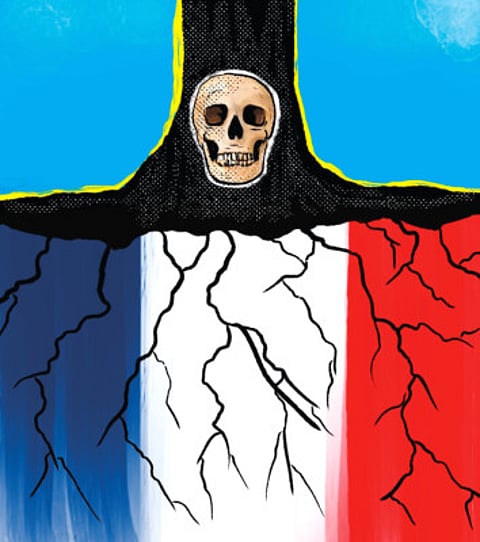Fight against terror should be on all fronts
Proper deployment of resources and methods available are enough to tackle this scourge of modern times

A recent attack in France that killed three people, including an army officer who swapped himself for a woman hostage and was murdered, has once again raised the usual questions on terrorism, the ways to fight the scourge, and popular solutions.
Analyst Richard Labeviere, in a recent book Terrorism, the hidden face of globalisation, starts with some basic findings: These intellectually-deficient criminals want publicity — let’s not give it. They want to be recognised as “enemies” — let’s not declare war on them. On the contrary, let’s start from square one, which is fighting crimes.
One thing is to see the facts, react emotionally and run the same story repeatedly on TV networks to give terrorists the publicity they seek. Another is to try and reflect. Is it nonsense ‘to make war’ at a concept or a modus operandi? One must be at war with whoever uses terrorism, the ones who are well-identified enemies. The petty criminals who have been radicalised — or have not yet been, or even possibly never will be — all deserve special attention. Many of them are already known, and necessary tools already exist to fight them: Increased domestic intelligence, more control of the internet, better jail management, stronger social monitoring with no wiggle room for extremist preachers or gang leaders. When you look at the number of convicted terrorists who will be released from jail in the coming years, it is clear there is no time to lose.
Fighting crime is a priority since around 50 per cent of these small-time thugs-turned-terrorists have a history of offences and served jail time. Discussions in France on monitoring suspected criminals and convicted criminals (a priest was murdered some months ago by an extremist wearing an electronic bracelet) and preventive custody of suspects, all miss a preliminary step: The need to restore state authority, starting with the territories the Republic has abandoned and prosecuting the offenders.
It is especially important when “fighting terrorism” becomes “fighting Islamist terrorism”.
The roots of terrorism, indeed, are diverse: Economic problems and social handicaps, uncontrolled immigration and missed integration, international tensions and external conflicts. The first one will require decades of continuous action; the second one is a matter of political will — and French President Emmanuel Macron is discovering how difficult it is to pass a bill on the subject. The third one requires a little bit of intellectual honesty.
“Islamist terrorism” came late in the story of terrorism. In the Middle East, it was preceded by “Zionist terrorism”, as reminded by the murder of United Nations Representative Earl Folke Bernadotte by the Lehi Jewish terrorist group in occupied Jerusalem in September 1948. Not to mention the April Deir Yassin massacre. Oddly, a recent petition-gathering move by French intellectuals against “Islamist terrorism” brought together the brave people — although a bit naive — with best supporters of those people who have been trampling for 70 years the rights of Palestinians over their land. Such mixing can only add confusion, especially when we see the continuing Israeli infringements of international law.
Reflecting on “Islamist terrorism” leads to an analysis of international events, and for a government it means adapting its foreign policy accordingly. Where are these terrorists coming from? Syria or Turkey? And so many of them! Who allowed them to enter the country with arms and ammunition? Who paid them locally? These foreign fighters who keep coming back to France are tomorrow’s terrorists or their sponsors.
Globally, it is common knowledge that the wars waged by the United States have created more terrorists than they have eliminated. The endless war in Syria provides the right conditions for terrorism to grow — especially if western media censors people who dare ask the ‘wrong’ questions: Who is financing the supposedly neutral ‘Syrian Rights Observatory’ based in London? Who is behind the supposedly humanitarian organisation, whose faked news and images overflow daily western TV screens? Who will be honest enough to remind us that the bulk of ‘Syrian Nationalist Rebels’ are part of Al Qaida and Daesh, holding the civilian population in Aleppo or Ghouta as human shields?
To fight terror successfully, wars must be short and the enemy well-defined. So one should not be ‘at war’ with “Islamist terrorism” or any other concept such as “underground Islamism” — even though strong opinions by Muslims would be welcome in the debate. With growing crimes in France, the diverse resources, which are widely available, ought to be better utilised. And abroad, a variety of actions should be employed to prevent the wars from being long-winding. That is the real challenge.
Luc Debieuvre is a French essayist and a lecturer at Iris (Institut de Relations Internationales et Strategiques) and the Faco Law University, Paris.


